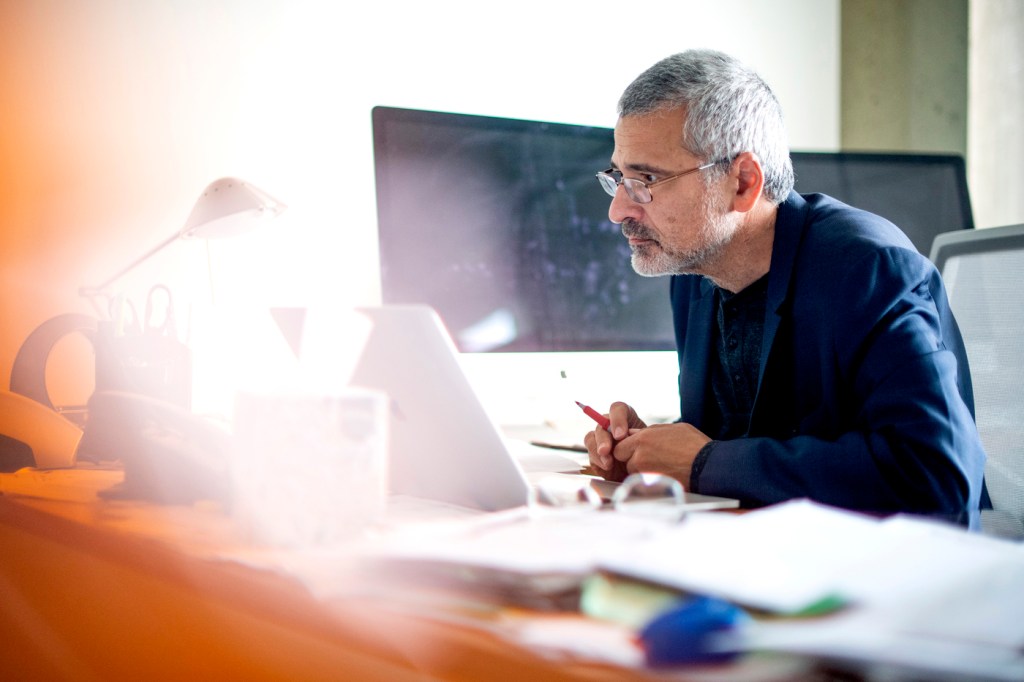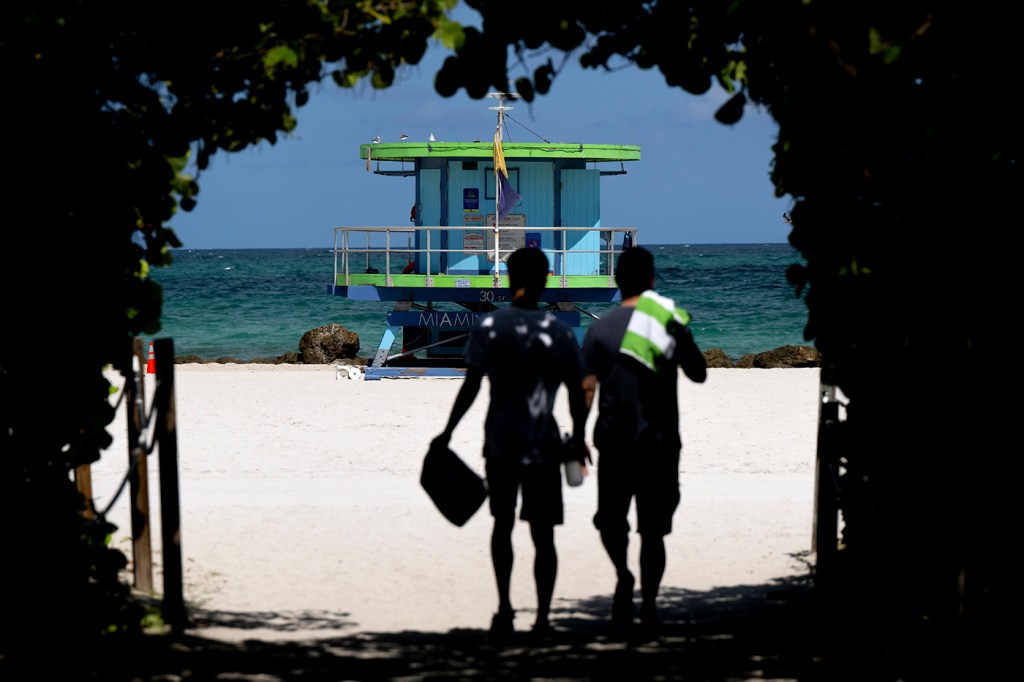He predicted the widespread COVID-19 pandemic early on. Now he’s been knighted by the Italian government.

Alessandro Vespignani doesn’t see himself as an oracle, and yet he saw it coming. The terrifying future was right there in the professor’s data.
“I remember that day as the heaviest in my life,” says Vespignani, director of the Network Science Institute at Northeastern. “I went home and…” he trails off. “You don’t even know how to communicate to your family something like that.”
It was February 12, 2020.
In his research, Vespignani models the possible scenarios for how a disease might spread. He’d been using data from around the world to simulate how and when outbreaks of COVID-19 might occur since the disease first emerged as a threat. And by the middle of February, the coronavirus that causes the disease was already traveling around the world. Vespignani’s simulations forecast that major outbreaks would be raging in many nations around the world in March, making the disease a pandemic. He called his research team into a meeting.
“I remember that I said to the team, ‘Let’s go back and redo everything. We need to be not double but triple sure that this is the case,’” he says. The team went over the data again, and again. “But we already knew that it was.”

Consul General of Italy in Boston, Federica Sereni, presents Alessandro Vespignani with the honor of the Knight of the Order of the Star of Italy. Courtesy of Dasha Alekseeva
Vespignani’s forecast of a major pandemic was confirmed in a deeply personal way. Italy, the country where he was born and raised, was the first country outside of China to experience a large outbreak of COVID-19.
“I remember having a lot of anxiety because I have family in Italy,” says Vespignani, who is the Sternberg Family distinguished university professor of physics, computer science, and health sciences at Northeastern. “But we had the clear feeling that this was not just for them. We knew at the time that these things would develop all over the place.”
Vespignani’s ties across the Atlantic made the scientist uniquely poised to foster international collaboration among researchers trying to make sense of the pandemic. And his work has now earned him knighthood.
The Italian government has bestowed upon Vespignani the honor of the Knight of the Order of the Star of Italy. That honor is given to Italians abroad or foreigners who have advanced cooperation between Italy and other countries. Anthony Fauci, director of the U.S. National Institute of Allergy and Infectious Diseases and the chief medical advisor to President Biden, also received the honor of knighthood from the Italian government this year.
“[Vespignani] trained many Italian students to become esteemed researchers, and over the years has maintained a close relationship with Italian scientific institutions,” a representative from the Italian Embassy in Washington, D.C. said in a statement. Vespignani, who studied theoretical physics at the University La Sapienza in Rome, is a member of the scientific council of the Institute for Scientific Interchange Foundation, a research institute in Turin, Italy, that focuses on complexity science, and theoretical and mathematical physics. He’s also on the supervisory board for Human Technopole, an Italian life sciences research institution.
“It was completely a surprise when the Consul General called me to tell me, ‘Alex, you have been knighted,’” Vespignani says. He recalls being confused by the honor and asking her to explain. “For me, it was quite unexpected.”
Vespignani has been fostering collaborations between Italian and American researchers, among others, long before the COVID-19 pandemic. In fact, during the Ebola virus outbreak from 2013 to 2016, Vespignani facilitated the connection between the Italian teams and the U.S. teams to work together to tackle that outbreak through the links he had already established between researchers in the two countries. His research, then, also won an award for collaboration, the first annual Aspen Institute Italia Award.
During the present crisis, Vespignani has become a fixture in both the American and Italian responses to COVID-19. His team of infectious disease modelers at Northeastern has developed and continues to develop a set of predictive models to project the future of the outbreak in various scenarios as part of a network of teams across the country that collaborates with the U.S. Centers for Disease Control and Prevention. His collaborations with Italian scientists have placed him squarely among that country’s set of pandemic experts, too. And he’s made several appearances throughout the pandemic in both U.S. and Italian media.
As a scientist, Vespignani’s ties to Italy weren’t just personal or collaborative. The nation was also in a particular position to yield early information about the new disease outbreak.
“Italy was the canary in the mine,” he says, of the country’s early outbreak. “Italy got the proof of what we were saying, that this was going to be a major pandemic all over the place. It was also the first place where data different from those coming from China were coming from.”
The days that followed his Feb. 12, 2020 realization that a major pandemic was coming were full of meetings during which Vespignani and other disease modelers urged university leaders, city leaders, state leaders, and federal officials to take the threat seriously. This isn’t going to be an issue of just quarantining one or two infected individuals, he would tell them. You are going to need to have plans for community-wide shutdowns in place because this virus can spread quickly.
“At the same time that I was saying those kinds of things, I was looking at myself from the outside and saying, ‘Are you crazy?’” he says. “I don’t even know how to measure the level of stress of those things.”
Vespignani wasn’t crazy, as we all know now. More than 4.4 million people have died of COVID-19 worldwide. As of July, only 14 countries and territories in the world had reported no cases since the pandemic’s onset, and the majority of those are islands that could be benefiting from travel restrictions.
“I already knew that it wouldn’t have been easy to convince people,” he says. “And there was this feeling that every day we were losing in that process, the situation was worsening.”
Over the past year and a half, Vespignani says sometimes his models were criticized for being pessimistic. But most of the time, he says, “we were even more optimistic than what occurred.” For example, in March 2020, his team projected that there would be perhaps 100,000 to 200,000 deaths in the U.S. from COVID-19 cases during the first wave of the pandemic. The death toll in 2020 was above 300,000, and is now over 630,000.
Vespignani took comfort in the fact that his team was not alone in seeing disaster in their projections.
“We were not the only ones. I would never say something like that if I was the only one. We are embedded in a community, and we were all having the same kind of evidence and data and results,” he says. Vespignani had been in contact with colleagues across the country, in Europe, at the World Health Organization, and at the U.S. Centers for Disease Control since SARS-CoV-2, the coronavirus that causes COVID-19, emerged as a concern. “The fact that there were many other people saying that this was going to happen was at least one way to share this burden.”
Now, with the highly transmissible delta variant, Vespignani has seen the increase in cases projected in his data for a while—well before they happened.
“I have my wife and my kids telling me from time to time that ‘we would really rather not know,’” he says. “They say, ‘We would like to be like the other kids and not know about that, and enjoy life for a few weeks.’”
For media inquiries, please contact media@northeastern.edu.





